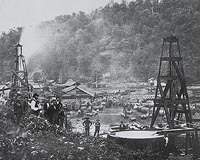 |
Caracas, Venezuela (UPI) Sep 2, 2009 Venezuelan President Hugo Chavez has scheduled a visit to Iran Saturday after talks with African and Middle East leaders during the Libya summit this week on forging strategic political, economic and possibly military alliances in the region. Iran's Fars News Agency said Chavez would hold a news conference in Tehran after discussions with Iranian officials. A number of bilateral agreements will be signed during the two-day visit by Chavez, said the agency, without mentioning a possible meeting with President Mahmoud Ahmadinejad. Venezuela's official news agency ABN said the international tour by Chavez proved that Venezuela was neither isolated nor locked in and had widened its relations in Africa and the Middle East. Chavez attended the special summit, held to celebrate 40 years of Moammar Gadhafi's rule over Libya, as part of his advocacy of closer collaboration between socialist nations of Central and South America, Africa and Asia. The Chavez tour coincides with international furor over Britain's release of Lockerbie bomber Abdelbaset Ali Mohmed al-Megrahi and the hero's welcome Gadhafi gave him in Libya, and a developing row between Argentina and Iran over the nomination of Ahmad Vahidi as Iran's defense minister. Vahidi is wanted by Interpol for his role in the bombing of a Jewish community center in Buenos Aires, Argentina, in 1994. Iran denies a role in the bombings. Chavez has cultivated OPEC partner Iran in recent months while Iran has stepped up its economic push into Latin America. Iranian business deals with private and state sectors in South American countries have multiplied, as diplomatic representations have mushroomed. When Ahmadinejad visited South America in 2007, Chavez acted as a guide for the Iranian as Nicaragua's Daniel Ortega and Ecuador's Rafael Correa held their presidential inauguration ceremonies. "It was a tour that solidified the 'Marxist-Islamist' relationship between Venezuela and Iran, and opened the door for Iran to develop deeper ties with leaders across the region," the Zurich-based International Relations and Security Network said. Since then, Chavez has awarded Iran observer status to his non-aligned trade group, the Bolivian Alternative for the Americas. Iran has announced the opening or widening of diplomatic representations in Chile, Colombia, Ecuador, Nicaragua, Bolivia and Uruguay. Trade between oil-rich Iran and South America has risen as recession in Europe and North America has diminished demand for Latin exports to those regions. Massive Iranian cash infusions have also helped Nicaragua, a major diplomatic hub for Iran in South America. One Spanish research study estimated Iran's cash commitments to Nicaragua in excess of $1 billion. Analysts said the recent trade and economic cooperation trends in South America showed China as a major financier, with Iran not far behind in some countries. Even noncommittal Brazil has courted Iran but has been careful to maintain transparency in its deals with Tehran. However, analysts noted that President Lula da Silva's recent preoccupation with reviving Brazil's weapons industry and giving the country's oil and gas industry a big push means there may be a greater role for Iran, experienced in both arms production and oil exploration, in Brazil as well. Share This Article With Planet Earth
Related Links Powering The World in the 21st Century at Energy-Daily.com
 Oil trade marks 150 years
Oil trade marks 150 yearsTitusville, Pennsylvania (AFP) Sept 2, 2009 One hundred and fifty years ago this week in a small Pennsylvania town an indefatigable businessman struck oil, changing the world forever. Boring a pipe deep into the Titusville ground, Edwin Drake drew black crude to the surface, in a process that would be copied all over the world and mark the dawn of the Petroleum Age. The method, inspired by salt extraction, would eventually create ... read more |
|
| The content herein, unless otherwise known to be public domain, are Copyright 1995-2009 - SpaceDaily. AFP and UPI Wire Stories are copyright Agence France-Presse and United Press International. ESA Portal Reports are copyright European Space Agency. All NASA sourced material is public domain. Additional copyrights may apply in whole or part to other bona fide parties. Advertising does not imply endorsement,agreement or approval of any opinions, statements or information provided by SpaceDaily on any Web page published or hosted by SpaceDaily. Privacy Statement |